The noise is deafening and sends waves of vibrations through my body. I feel like I’m standing next to a speaker at a nightclub. The burn of the aviation fuel creates a haze above the machine. The marshal waves his green flag and the noise gets louder. The front wheels go up and “Baby Duck” tears up the track.
Welcome to the world of tractor pulling.
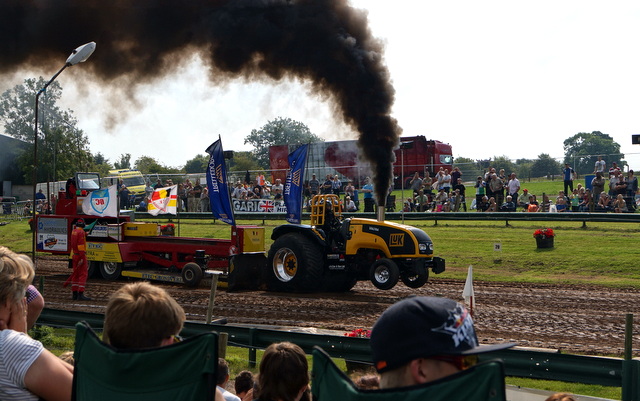
Now I’m no stranger to tractors. I grew up on a farm and spent a lot of my childhood bumping along in the cab with Dad, sitting in the bucket on the front or the forks on the back, or learning to drive it myself. But tractors were for work or for Dad to start collecting when he retired.
Not these. These are for sport.
Although tractor pulls are held in Tasmania, I’ve never been to one. I wrote the sport off as country and perhaps a bit hill billy. But tractor pulling is closer to car racing and monster trucks than it is sheep dog trials.
Some of the tractors parked in the pit at the Great Eccleston Tractor Pull (yes, the home of Eccles Cakes) looked like the ones that rolled up and down the roads in the farming district I lived in. Others had probably never come within spiking distance of a hay bale. They resembled the machines I imagine grace the ring at Monster Truck-style events. The tractors started rolling in on Friday night, some accompanied by team buses similar to what I’ve seen at Tour de France. If the UK economy is struggling, there’s no sign of it here.
Tractor pulling stems from the days when farmers would pit their horses against their neighbours’ to see whose could pull the most. As technology advanced, so did the style of competition. Some of the tractors on show now are packing up to 8000 horsepower. Your average Formula One car reaches about 900. It’s no wonder tractor pulling is known as the world’s most powerful motorsport. The seats are the same as those used in racing cars, the drivers wear full racing suits and helmets and the tractor cabs have been replaced a version of roll cages. Some classes are determined by weight so every gram matters.
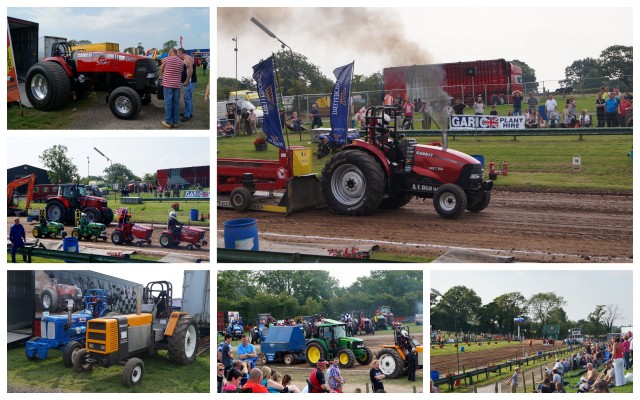
Tractor pulling is pretty much what the name suggests.
The tractors pull stuff. By stuff I mean a weight transfer sledge. The sledge carries a box of weight, which moves forward as the sledge is pulled along so the further the sledge travels, the heavier it gets. The tractors in each class start with the same weight in the box and see how far they can pull the sledge down the 100m track. If they cover the length of the track it’s called a “full pull”. The event started with the Garden Pullers, which were mostly driven by kids. If you think this is a sport for boys, think again. A 13-year-old girl took out several of the lower classes. In the UK, teenagers can get a tractor license at 16, a year before they can learn to drive a car. Apparently it isn’t uncommon for country kids to drive themselves to school in a tractor. The licence isn’t required to compete at the pull, however the underage drivers aren’t allowed to drive outside competition and are towed to and from the track.
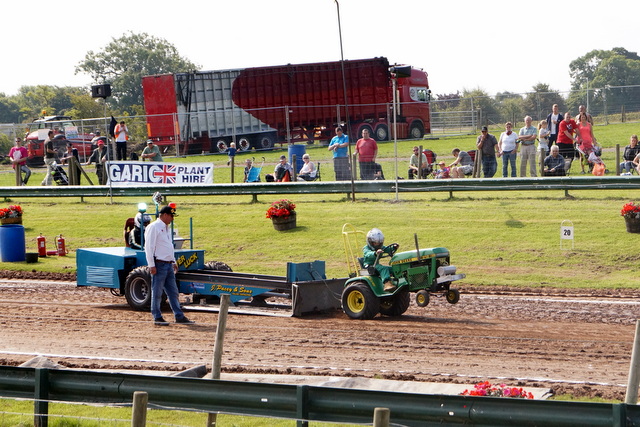
While many of the tractors might look like the ones you see ploughing a paddock or cutting hay, few of them could manage that. The engines, which cost several thousand pounds, are designed for this sport and are that powerful they sometimes only have 1500m in them. After they’ve pulled the sledge down the track, most are towed off either to conserve the engines or because they just can’t make it any further.
The tractors, as powerful as they are, are also temperamental. Several, despite the revving and the smoke billowing from the engine, either didn’t move or only made it a few metres up the track. Some (unintentionally) took the slow and steady approach, tugging the sledge along the dirt until it just. couldn’t. move. anymore.
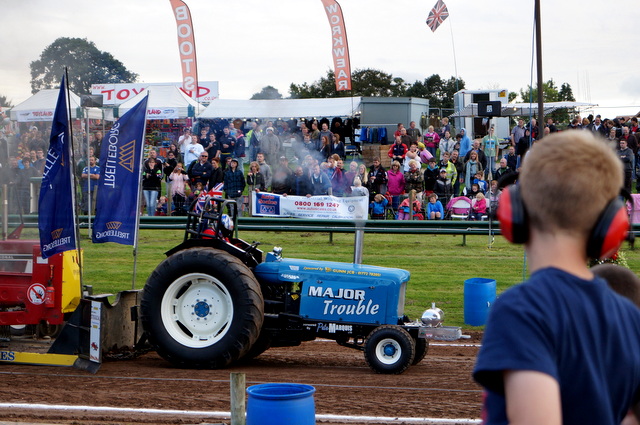
But others put on a show, which is what the crowd on the banks were there to see. The engines would rev, the white smoke would turn to black and then, if things went as planned, the tractors lifted up on their back wheels and took off, jetting down the track. The momentum the tractors build up renders the steering wheels useless and the drivers instead rely on brakes connected to the left and right tyres to guide the machine at speed.
The last class to hit the track was the modified tractors such as the methanol-fuelled Snoopy 3, Snoopy 4 and Double D. This is Baby Duck’s category. They are big and LOUD! Most of the crowd makes a call between covering their ears and recording the show on their phones. One of the tractors carries the type of engine used in planes and army tanks. This is serious business.
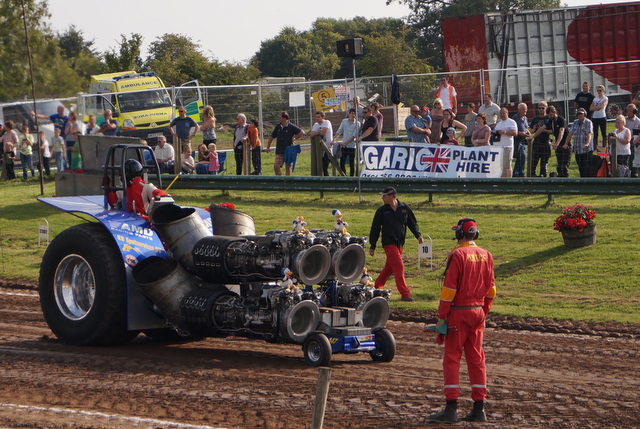
Behind the scenes
With only about six tractor pulls held in the UK each year, it’s usually the same crowd at each one. This event was organised by the North West Tractor Pullers Club. The main action happens on the Saturday, with the modified tractors pulling under lights at nearly midnight. The second day of the pull is when teams can afford to try something new – that’s if their tractors have survived. A fair number of tractors suffered “terminal” problems after the first lot of pulls and were scratched from Sunday’s running order.
While it is a competition, the teams aren’t always concerned with winning. They can’t test their tractors outside the organised events so many turn up having little idea how their machine will perform. One team used a gap in the program on the Sunday to test repairs to their tractor. It tore down the track without a hitch. “I reckon the problem is fixed,” I said to my friend over the cheering crowd.
Tractor pulling may not be the cultural experience most tourists are looking for when they visit the UK, but my weekend at Great Eccleston was a lot of fun and gave me more of an insight into Britain than any visit to Stonehenge or the Cotswolds. This was rural British life in all its smoking glory!





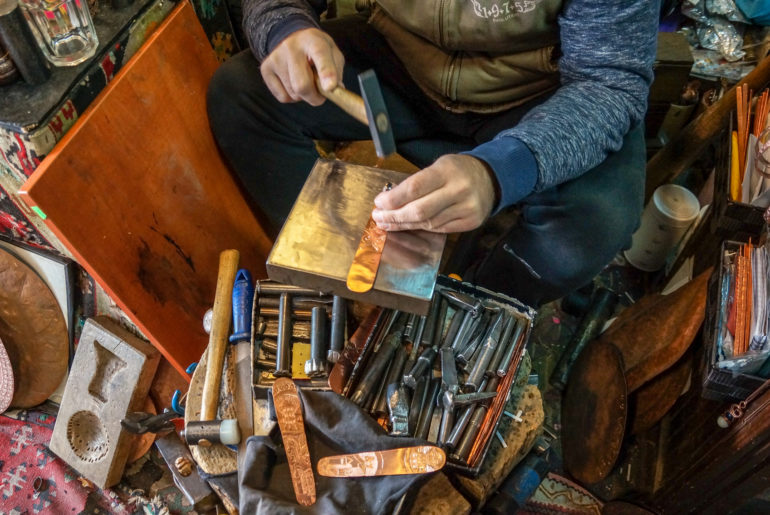
4 Comments
The first article that I have ever read that truly sums up the spirit of Tractor Pulling.
Tractor Pulling a great stop for every petrol head traveller!
LOVE IT!!!
One day in the future we will have to go to an Aussie tractor pull together and see if the spirit is different.
Ill try not to fall down any hills next time!!
Daddy loves your article Pegs and is considering bringing out the 1949 David Brown crop master!
click – http://www.tractorpulling.co.uk for all next years top tractor pulling events, our AGM (open to all) is Sunday 19th Jan at Holiday Inn, Birmingham (Off J7)